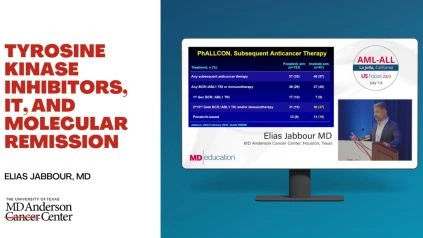Elias Jabbour, MD- Professor, Department of Leukemia, Division of Cancer Medicine, MD Anderson Cancer Center, Houston, TX
The talk, delivered by Elias Jabbour, MD, centers around the treatment paradigm for Philadelphia chromosome-positive acute lymphoblastic leukemia (Ph+ ALL), proposing a shift from traditional chemotherapy to tyrosine kinase inhibitors (TKIs) and immunotherapy. Dr. Jabbour discusses the historical use of allogeneic stem cell transplantation and its limitations. The presentation delves into data from MD Anderson and other studies, emphasizing the challenge of achieving high survival rates. The concept of complete molecular remission (CMR) is underscored, with an emphasis on early molecular response deepening. Notably, the study featuring ponatinib, a potent TKI, demonstrates promising outcomes including high CMR rates and improved survival. The talk also highlights the significance of next-generation sequencing (NGS) in gauging response and guiding treatment choices. Dr. Jabbour concludes by suggesting that patients achieving CMR via NGS might forego transplantation, indicating the potential of TKI-based approaches to minimize reliance on chemotherapy.
Furthermore, Dr. Jabbour touches upon combining TKIs with immunotherapy, presenting a regimen integrating blinatumomab and ponatinib, showcasing favorable responses and survival rates. The ongoing exploration of avoiding chemotherapy entirely and the role of NGS in guiding transplantation decisions are key points of discussion. Dr. Jabbour posits ponatinib as a promising TKI and suggests that it could pave the way for a chemotherapy-free strategy in the long-term management of Ph+ ALL patients, providing sustained deep molecular remission. The evolving treatment landscape and potential avenues for curative interventions are highlighted as areas warranting further investigation.

